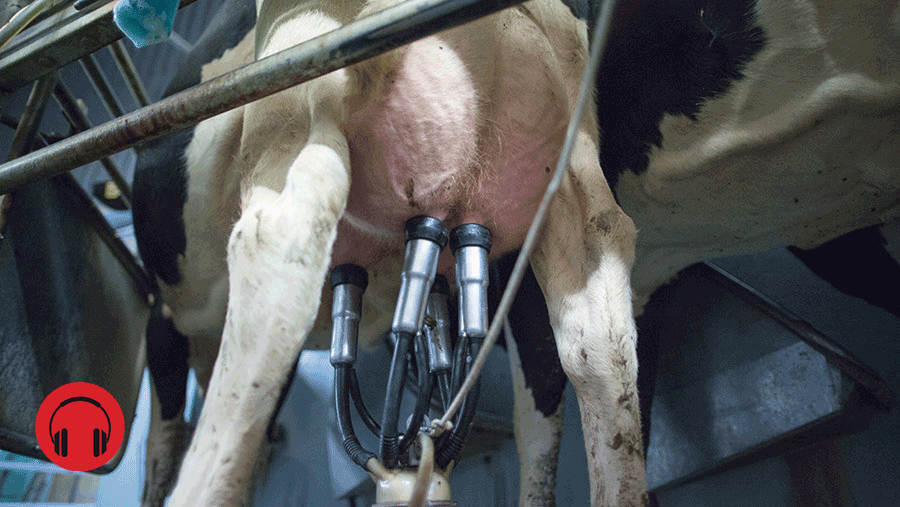Milk price differentials highlight liquid market issues
 © Tim Scrivener
© Tim Scrivener Listen to Suzie Horne read this article or see the text below.
Manufacturing milk prices are firmly heading for 40p/litre, challenging the liquid market to keep up.
A slew of April price announcements this week saw up to 2p/litre added to the farmgate price for several cheesemakers, while the Global Dairy Trade (GDT) online commodity auction index reached another record high.
The fortnightly GDT sale on 1 March saw every commodity rise in price, putting the index at 1,593, with cheddar values up by a remarkable 10.9%.
The index has risen in 12 of the most recent 14 sales, and its previous high was 1,573 in April 2013.
Other notable increases at this week’s sale were recorded in butter (+5.9%), buttermilk powder (+5.8%) skim milk powder (+4.7%) and whole milk powder (+5.7%).
See also: Outlook 2022: costs outstrip milk prices
The growing difficulties in the liquid milk market are highlighted by Kite Consulting in its Beyond Reset report, which warns that milk as a supermarket loss-leader is unlikely to remain viable.
The liquid market doesn’t provide profitable returns for either UK dairy processors or the farmers who supply them.
Those processors could generate higher returns by exporting to high-value markets overseas, says the report.
UK price lag behind global values
Kite’s analysis shows that since 2019, UK raw milk prices have lagged behind world prices by an average of £4.29/100kg, particularly in the liquid market, where there has been intense price competition between retailers.
Meanwhile, global dairy demand has outgrown supply and this unsatisfied demand will rise.
Kite managing partner John Allen said the study shows that UK dairy processors could make a strategic decision to improve returns by supplying growing global markets when domestic markets generated comparatively poor returns.
“This changes the dynamics in the market and creates a ‘new normal’ which, when combined with a liquid milk sector in the UK that has consistently underdelivered on price in recent years compared with other sectors, has the potential to drive structural change across the UK dairy industry,” said Mr Allen.
“With this dynamic in the market, it seems unlikely that liquid milk as a retail loss-leader in the UK will remain viable – if retailers want to secure long-term supply from partners that are committed to fulfilling their decarbonisation objectives, they need to provide a competitive market return.’’
Liquid value reset needed
Mr Allen called for a reset, prioritising fresh liquid milk and valuing it accordingly.
Based on 2020 data in the public domain, Kite has calculated the weighted average earnings before interest and tax (Ebit) for UK processors focused on the liquid market at £1.02/100kg of milk, while the weighted average for all other UK processors is £2.24/100kg.
In comparison, a group of leading global dairy processors generated an average Ebit of £3.35/100kg, processing about 10 times the total UK production.
Changing global market
Traditionally, world prices have been lower and more volatile than UK prices, with higher peaks and deeper troughs, says the report.
However, since EU quotas were abolished in 2015, the world market has caught up and since 2019, UK raw milk prices have lagged behind world raw milk prices, particularly in the liquid market.
The Kite report chimes with the NFU’s recently launched dairy export strategy, which has ambitions for a doubling of UK dairy exports in 10 years.
NFU dairy board chairman Michael Oakes said: “The commodity cheese market is buoyant. If milk is diverted to exports, it’s got to be good for farmers if processors put product where the best return is.”
Latest milk price moves
Cheesemakers
- Saputo (formerly Dairy Crest) 2p/litre price rise from 1 April for the 330 producers supplying its Davidstow creamery, taking their price to 38p/litre for a milkprices.com manufacturing standard litre (4.2% butterfat, 3.4% protein)
- Barber’s 1.29p/litre increase puts the April standard manufacturing price at 37.55p/litre. Barber’s is also paying a B-price of 46.86p/litre for February excess litres above a producer’s base milk volume, subject to a threshold
- Wyke Farms 1.81p/litre rise from April 2022 to 38.31p/litre (manufacturing standard litre)
- Belton Farm 1.5p/litre increase from April to 37.05p/litre (manufacturing standard litre).
Liquid processors
- Muller Direct -1.5p/litre price rise from 1 April 2022 for the 500 farmers supplying Muller on direct contracts, taking their discretionary base price to 35.5p/litre from 1 April 2022 (standard liquid litre, 4% butterfat, 3.3% protein). Most direct contract suppliers will also receive a 1p/litre premium, paid quarterly as part of Muller’s Advantage programme
- Muller M&S 0.99p/litre rise to 40.03p/litre in April, for a small number of producers (standard liquid litre)
